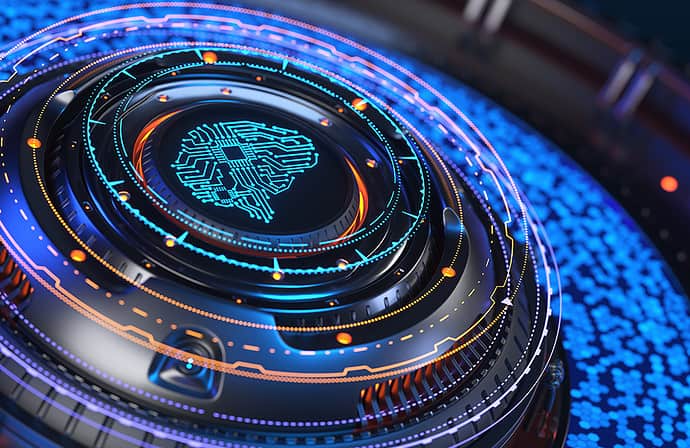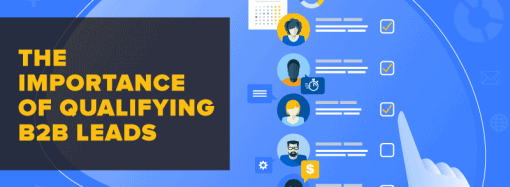The landscape of business-to-business (B2B) marketing is being transformed by the power of Artificial Intelligence (AI). By leveraging large data sets and gleaning actionable insights, AI allows marketers to make data-driven decisions, boosting efficiency and optimizing campaign results. Let’s delve into the various applications of AI for B2B marketing. Personalizing Experiences and Segmenting Customers with
The landscape of business-to-business (B2B) marketing is being transformed by the power of Artificial Intelligence (AI). By leveraging large data sets and gleaning actionable insights, AI allows marketers to make data-driven decisions, boosting efficiency and optimizing campaign results. Let’s delve into the various applications of AI for B2B marketing.
Personalizing Experiences and Segmenting Customers with AI One of the foremost advantages of AI in B2B marketing is its ability to facilitate personalized customer experiences. AI systems sift through customer data, segmenting detailed profiles based on preferences, behaviors, and demographics. This allows marketers to design targeted campaigns that align with their audience’s interests, leading to increased engagement and conversion rates.
Harnessing AI for B2B: Personalizing Experiences and Segmenting Customers
One of the foremost advantages of AI in B2B marketing is its ability to facilitate personalized customer experiences. AI systems sift through customer data, segmenting detailed profiles based on preferences, behaviors, and demographics. This allows marketers to design targeted campaigns that align with their audience’s interests, leading to increased engagement and conversion rates.
For instance, a B2B software enterprise harnesses the power of AI to analyze user behavior on their site. This analysis facilitates segmentation of the audience based on their browsing patterns, content engagement, and job roles, allowing the company to tailor email marketing campaigns according to each segment.
AI for B2B: Powering Predictive Analytics

Image Created by AI. DreamFactory.ai
AI’s role in predictive analytics is becoming crucial for B2B marketing. By scrutinizing historical data and identifying trends, AI can forecast future outcomes, allowing marketers to make well-informed decisions. This approach can help identify potential customers, estimate customer lifetime value, and predict lead conversion possibilities.
Consider a B2B technology provider that leverages AI-powered predictive analytics to determine which leads are most likely to convert into customers. This targeted focus improves return on investment and optimizes the marketing budget.
Chatbots and Conversational AI: Streamlining Customer Engagement
Streamlining Customer Engagement Chatbots and Conversational AI are emerging as indispensable tools for B2B marketers, offering immediate customer support and engagement. These virtual assistants, powered by AI, can manage customer inquiries, schedule appointments, and even qualify leads, thereby simplifying sales and customer service processes.
For example, a B2B logistics firm uses a chatbot on its website to provide immediate customer responses and instant quotes, improving service consistency, response time, and freeing up human resources for more complex tasks.
AI for B2B: Transforming Content Creation and Optimization
AI can significantly aid marketers in creating, producing, and optimizing content. Natural Language Processing (NLP) and Machine Learning algorithms can review existing content, identify gaps, and suggest improvements for enhanced engagement and SEO performance. Moreover, AI tools can generate content ideas, draft copy, or even personalize content based on customer segmentation.
A B2B financial services firm, for example, uses AI to analyze blog content and discern topics that captivate its target market. By creating blog posts targeted towards this group, the company boosts its organic search rankings and attracts more qualified leads.
Performance Analysis and Optimization with AI
AI allows marketers to monitor and optimize campaigns in real-time. By examining performance data, AI can pinpoint areas for improvement, suggest modifications, and autonomously adjust campaign parameters for maximum efficiency.
A case in point is a B2B manufacturing company using AI-powered marketing automation software to assess its Google Ads campaigns’ performance. The system identifies underperforming keywords, suggests budget adjustments, and optimizes ad copy, resulting in higher click-through rates and lower cost per acquisition.
Social Media Monitoring and Sentiment Analysis through AI

Image Created by AI – DreamFactory.ai
AI-powered social media tools allow B2B marketers to keep track of conversations, monitor brand mentions, and perform sentiment analysis across various platforms. This understanding enables marketers to quickly address concerns, identify trends, and make strategic decisions to effectively engage their target market.
A B2B healthcare company, for instance, uses AI to analyze social media conversations about its products and competitors. By understanding customer pain points and recognizing positive feedback, the company can adjust its messaging, address customer concerns, and utilize strengths in its marketing campaigns.
Improving Lead Scoring with AI
AI can greatly enhance the accuracy and efficiency of lead scoring in B2B marketing. By analyzing data points such as demographic information, online behavior, and past interactions, AI can accurately score leads based on their likelihood to convert.
A B2B SaaS company, for example, uses AI-powered lead scoring to prioritize leads generated from content marketing campaigns. By focusing on high-scoring leads, resources can be allocated more efficiently, increasing conversion rates and shortening sales cycles.
Email Marketing Enhanced by AI
AI can help optimize B2B email marketing campaigns by enhancing subject lines, content, and delivery timings. By analyzing open rates, click-through rates, and other engagement metrics, AI can identify the most effective strategies for each audience segment, leading to more successful campaigns overall.
Consider a B2B marketing agency using AI to customize its email campaigns for different client segments. By applying data-driven insights from AI to tailor subject lines, content, and delivery times, email open rates and click-through rates significantly improve, leading to higher client satisfaction and retention.
AI-Powered Programmatic Advertising
AI-driven programmatic advertising platforms allow B2B marketers to automate the purchasing, placement, and optimization of digital ads. These platforms can accurately target specific audience segments, ensuring ads reach the most relevant prospects at the ideal time.
For instance, a B2B cybersecurity company uses an AI-powered programmatic advertising platform to reach IT decision-makers within specific industries. The platform auto-adjusts ad placements and targeting based on real-time performance data, ensuring ads reach the most relevant audience, leading to higher engagement and conversion rates.
Mapping Customer Journeys with AI

Image Created by AI. DreamFactory.ai
AI can assist B2B marketers in mapping and analyzing customer journeys, offering valuable insights into the touchpoints that influence purchasing decisions. By understanding this journey, marketers can identify opportunities for improvement, optimize campaigns, and deliver a more streamlined and personalized experience.
For example, a B2B software provider uses AI to map customer journeys from initial touchpoints to post-purchase interactions. With these insights, they can identify areas for improvement and tailor content for specific stages in the buying journey, leading to improved customer satisfaction and retention rates.
In conclusion, AI offers a wealth of opportunities for B2B marketers looking to enhance their campaigns, achieve superior results, and gain a competitive edge. By adopting AI-driven strategies, B2B professionals can make more informed decisions, provide personalized experiences, and optimize their marketing efforts for maximum impact.
→ Want more AI for B2B Marketing Tips? Check out how AI can optimize your B2B buyer personas.













